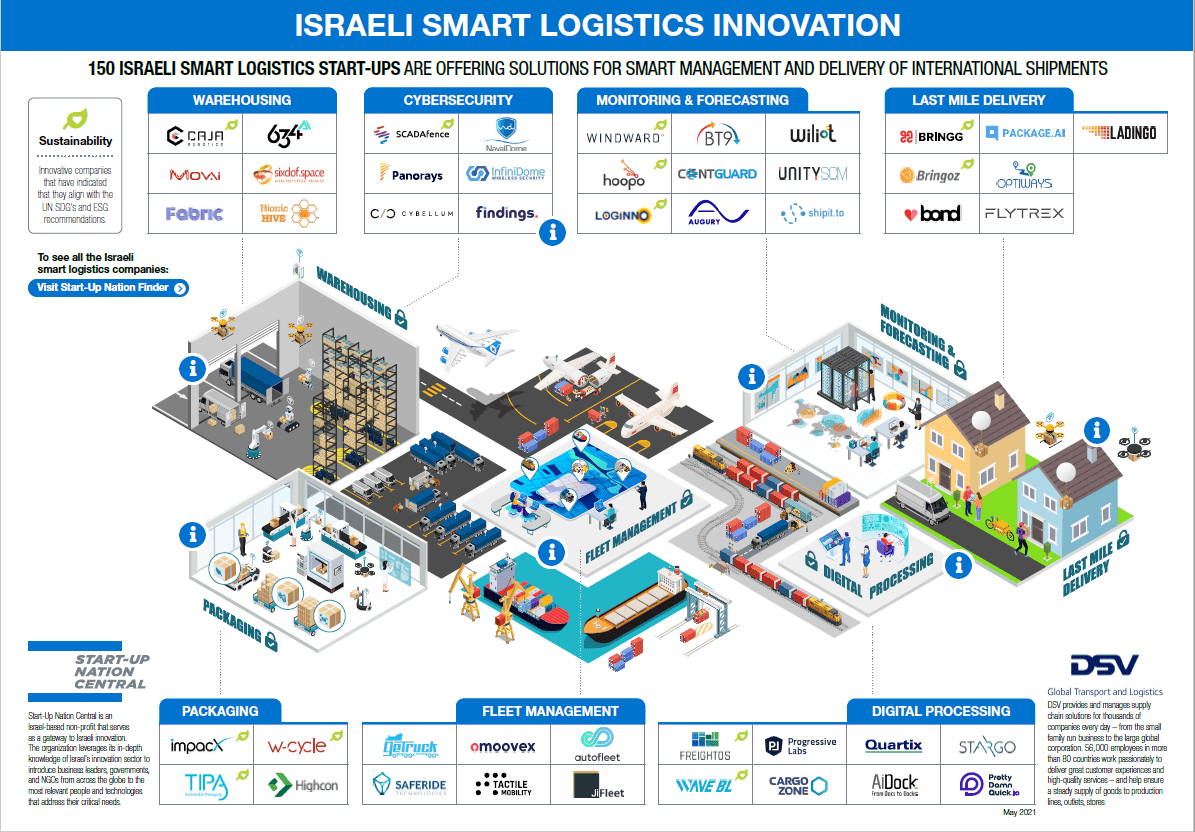Israeli Smart Logistics Innovation Companies Add Precious Links to the Global Supply Chain
Tech Innovation
When it comes to expectations for goods providers these days, consumers demand fast and flawless service. Whether dealing with fresh milk from the supermarket or an imported electronic device manufactured half a world away, people want their purchases to arrive promptly and without mistakes. While it’s a demand that may seem ambitious, it’s one that the global supply chain industry is doing its best to accommodate and is making great strides towards.
Few people appreciate what takes place between the moment they hit the “purchase” button on their smartphone or computer and the moment the item they ordered lands in their hands, ready to star in their latest unboxing video. But what happens behind the scenes is a truly mind boggling array of activity, often involving multiple companies from a wide variety of sectors and on a global scale. Efficient oversight and control of such an operation in real-time requires tools to properly manage supply chains. Currently an $18 billion industry, the supply chain management market is expected to grow to $37.4 billion by the end of 2027 as consumer demand grows. Israel’s thriving tech sector is itself home to more than 150 startups that are involved in various aspects of the industry, employing cutting-edge technology to help ensure that goods are delivered swiftly and efficiently.
In order to better get to know the innovative solutions offered by the local ecosystem, Start-Up Nation Central partnered with DSV to create an interactive landscape detailing some of the top up-and-coming innovative companies in the field. The map, published in early May, breaks the local industry into seven sub-sectors, each responsible for a different link in the chain.

Links in the Chain
Gone are the bustling, noisy, exhaust-filled warehouses of the past. Nowadays warehouses, such as those operated by Fabric or Caja Robotics, are silent and nearly sterile, operated predominantly by robots that scurry from one place to another powered by quiet electric motors according to advanced algorithms that track the precise location of every item of inventory and deliver them to where they are needed in the most efficient way possible. Even the work of human pickers is determined by advanced Warehouse Management Systems, resulting in seamless cooperation between people and machines, a dramatic development known as cobotics. In addition to accelerating the warehousing process, the automated systems also maintain strict stock-taking, drastically reducing human error and increasing supply chain transparency.
Packaging is the part of the supply chain that provides coordinated systems for preparing goods for safe and efficient transportation. The companies in this category take their mission to the next level, using cutting-edge technologies. Environmentally-friendly packaging solutions by TIPA and W-Cycle offer biodegradable boxes and pulp-packing products, while impacX integrates sensors into caps and lids to monitor product use and send alerts when refills are needed.
Fleet Management solutions allow organizations to coordinate entire fleets of vehicles, with the aim of improving efficiency, reducing costs, and providing regulatory compliance. The companies in this category take the newest and most advanced features from the mobility world and adapt them to the needs of high-volume transporters. From an app for locating available trucks (GeTruck), to a platform that optimizes complex transportation operations (Moovex), to intelligent vehicle tracking (Tactile Mobility), to AI-based vehicle maintenance and fuel management solutions (AutoFleet, JiFleet), these Israeli startups are revolutionizing the bulk transportation of goods.
In order to keep track of the immense volume of goods that are being shipped around the world, modern supply chains demand sophisticated monitoring and tracking solutions. The Israeli startups featured in the Monitoring and Forecasting section of the map do everything from providing low-power, wide-area monitoring technology (hoopo), to harvesting energy from radio waves to power BlueTooth tags for IoT devices (Wiliot), to active and accurate ship and container-level tracking (Loginno). All the data that is generated throughout the various parts of the supply chain allows the industry to become far more capable of identifying breaks in the chain and in some cases—like when it comes to Mechanical Diagnostics company Augury—even predict malfunctions and alert operators in time to overcome them.

Other overarching key areas of the smart logistics industry include Digital Processing, which increases operational effectiveness by leveraging emerging digital supply chain business models, and Cyber Security, which ensures that the entire industry remains safe from malicious players seeking to disrupt the chain for illicit profit or other nefarious reasons.
The last step of the supply chain is referred to as Last Mile Delivery. Whether the goods reach the buyer via handheld courier, delivery van, or by drone, the companies in this category seek to make an impact where it counts the most. Offering solutions such as delivery operation management (Bringg), route optimization (OptiWays), neighborhood-level distribution centers (Bond Post Purchase), AI-powered concierge chatbots (PACKAGE.AI), and automated dispatch, these Israeli companies seek to leave customers with a favorable impression, ensuring that the products arrive at their destination promptly and with minimum cause for returns.
Israeli innovation driving radical change
As we witnessed at the start of the COVID-19 pandemic and again more recently with the blockage of the Suez Canal, supply chains are fragile and any disruption in one place causes a domino effect that is felt around the world. Adopting innovative technology to improve supply chain efficiency is a benefit to the entire world. In addition to lowering costs, increasing transparency (and thereby trust), providing better responses to malfunctions, and forecasting future shortages, employing smart logistics is also a boon to the environment. The manufacturing and cargo transportation industries are the biggest producers of harmful emissions and therefore anything that can help them become more efficient is a net gain for the entire planet.
The world is waking up to these benefits—and so are investors. Over recent months, there have been multiple Israeli success stories in the field, from U.S. retail giant Walmart, which has initiated pilot programs with Fabric and Flytrex, to Approve, which was acquired by Tipalti for $40 million, to stor.ai that completed a $21 million funding round, to BionicHive, which earned recognition from none other than Elon Musk.
As the world gears up for radical change in supply chain logistics with the massive increase of eCommerce and the adoption of agile solutions by traditional sellers, innovation will be a key factor and driving force for change. Israeli startups, many of whose products rely on big data and deep tech, are paving the way to the future and becoming precious links in the global supply chain.
Ofir Bronhaim is Head of Innovation, Israel for DSV – Global Transport and Logistics, which provides and manages supply chain solutions for thousands of companies, helping them ensure a steady supply of goods to production lines, outlets, stores, and consumers all over the world.
 Tech Ecosystem
Tech Ecosystem Human Capital
Human Capital Focus Sector
Focus Sector Business Opportunities
Business Opportunities Investment in Israel
Investment in Israel Innovation Diplomacy
Innovation Diplomacy Leadership Circle
Leadership Circle Our Story
Our Story Management Team
Management Team Careers
Careers